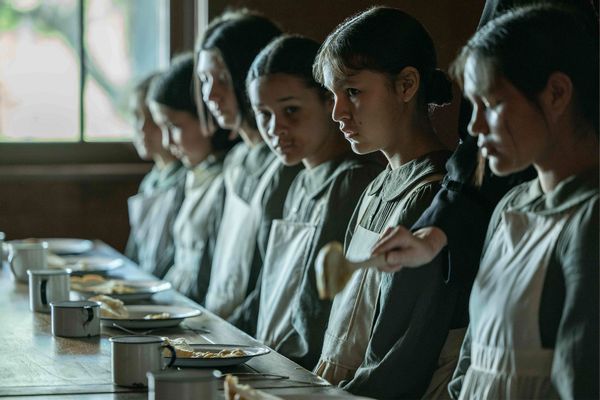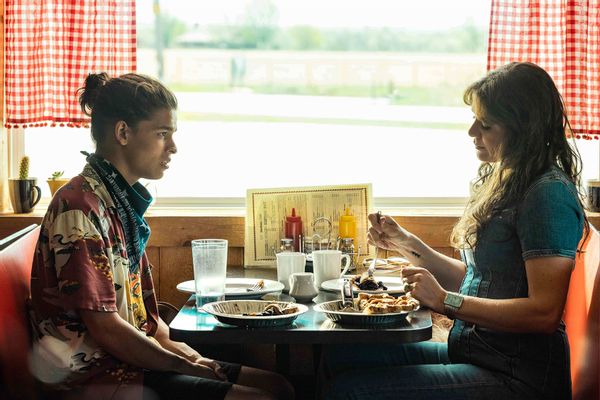
Among the many complex characters introduced throughout "Reservations Dogs," Deer Lady made the most substantial impression in the shortest amount of time. She's only appeared in one episode before the third season episode that bears her name – Season 1's "Come and Get Your Love," where we meet her in a flashback to the childhood of Lighthorseman Big (Zahn McClarnon).
Deer Lady, portrayed incomparably by Kaniehtiio Horn, is central to Big's self-image as a force of good. But whether a person views her thusly is a matter of perspective and circumstance. She's a spirit common to several Indigenous cultures, known as both an instrument of vengeance and a protector. Big's first encounter with Deer Lady comes after he's noticed her in connection to a missing person case and a bloodbath at the local grocery store. In both instances, the disappeared or dead are men who were up to no good.
That matches the character's reputation as a man killer. But as tells Big, her targets aren't indiscriminate.
"I kill bad men," she says. "But you're not bad. You're good. So you ain't got nothing to worry about. Just stay that way."
She goes on to warn him that he's going to want to give up, "but um, just don't do that. . . . So I guess what I am saying is, be good."
The show's audience certainly wanted to see more of Horn's cosmic vigilante, which director Danis Goulet answers with an episode that doubles as Deer Lady's origin story and an eye-opening look at the appalling history of government-sanctioned Native boarding schools.
Consistent with the show's homages to late 20th-century American cinema, "Deer Lady," written by series creator Sterlin Harjo, plays like a horror movie.
"In the indigenous community, we're very familiar with residential school history. It isn't news to us," Goulet, the Cree-Métis filmmaker, told Salon in a recent phone interview. "But immediately, you just think, 'This is a horror show.' What better genre to face the kind of terror of what it would be like, as a child, to be taken away from your family, having no idea what's going on, not being able to understand the context that you're being brought into?"
Goulet, who also directed this season's premiere and Season 2's "Mabel," explained that the 2018 reboot of Dario Argento's '77 classic "Suspiria" was a stylistic reference point for "Deer Lady," "just because it takes place in a dance school, so has that kind of institutional feel with the aesthetics and the darkness, and it pulls from all of the '70s references."
Goulet's vision makes the children's days look as cold and dark as the evenings and centers the children's perspective. Their conversations are subtitled while those of their white captors, mainly abusing nuns, sound like alien gobbledygook. The gibberish, Goulet explains, adds a disorienting element that augments the terror.
"No one leaves," one of the children warns Young Deer Lady (Georgeanne Growingthunder), "unless you go to the cemetery."

This is in line with the terrible history of these places. A report released in 2022 as part of the Department of the Interior's investigation into federal boarding schools, cited in NPR coverage, indicates that between 1819 and 1969, the government operated more than 400 such institutions and supported more than 1,000 others, including schools affiliated with the Catholic church. It also counted 53 schools with marked and unmarked burial sites, a tally the department expected to increase as the investigation continues.
In 2021 Canadian authorities confirmed the unearthing of 215 children's remains at a burial site nearby what used to be an Indigenous residential school in British Columbia. Weeks later another 751 unmarked graves were discovered at another former boarding school in Saskatchewan, Canada.
As University of New Mexico professor Nick Estes explains in a High Country News report, these schools were designed as a means of both decimating Native culture and pressuring tribes into giving up their land by taking their children hostage.
As American citizens battle over the false rewriting and erasure of our history, these accounts along with so many others about and by marginalized communities are considered too emotionally taxing for white people to contend with. So what better way to crack the curiosity of the culturally intransigent than to make this history personal by way of someone whose primary superpower is captivation?

In her latest appearance, when she crosses paths with a very lost, wandering and hungry Bear (D'Pharaoh Woon-A-Tai), she sports a Penny Lane coat and huge glasses, channeling Kate Hudson's "Almost Famous" rocker girlfriend. (She's also reading "I Remember," a literary cult classic written by Oklahoma artist Joe Brainard, described in many accounts as one of the nicest guys they ever met.) These details solidify the impression of Deer Lady not as a murderous seductress but, rather, that cool aunt or older sister watching out for folks.
"Everyone loves and knows the badass heroine, you know, and we've seen her in other episodes righting wrongs and making sure that everyone's living according to the right values," Goulet seconded. "But I think this episode really allows you to get a deeper understanding of why she does what she does, and that it's incredibly personal.
"And Kaniehtiio Horn as an actor, I was blown away," Goulet added. "In so many moments, when we were shooting at how magnetic she is on screen, how watchable like you just cannot take your eyes off of her. . . . She's got so much dexterity as an actor, and range, and she really gives this character so much more dimension."
Goulet sees what "Reservation Dogs" has accomplished in its three seasons as a triumph but also a start, one that would not have been possible if not for Harjo and his co-creator Taika Waititi's relentless push to make it and grant opportunities to actors and writers who aren't often given a foot in the door. The ongoing strikes that the Writers Guild of America and SAG-AFTRA, the guild representing film and TV actors, are in part dedicated to ensuring that opportunities for newcomers expand instead of contract. (Salon's unionized employees are represented by the WGA East.)
Goulet, who was able to speak with us as a member of the Directors Guild of America, which came to an agreement with the AMPTP weeks ago, emphasized her unconditional support for her colleagues.
"This show, when you think about its creation, it didn't start when Taika and Sterlin got together. It came off of decades of advocacy, by indigenous creatives in the industry saying, we deserve a chance to be at the helm of our own stories. And so when doors open and a show like this gets made, it's a really big deal. We know the talent's there, just open the door, and we'll show you what we can do. That's what the show has really done. And it's so important to honor it."
In its confluence of excellent directing writing and performances, with Horn's being a highlight, "Deer Lady" exemplifies the enriching cultural potential that can be achieved on TV when underrepresented voices are given space to tell their stories their way.
"Usually when I cross paths with someone," Deer Lady tells Bear, "There's a reason." This time her purpose is very clear, making sure we won't forget her, her story or the history that created her. "Fight evil," Deer Lady advises another child in a past episode. "You do that and you'll never, ever have to see me again." Oh, but we hope that's not true.
New episodes of "Reservation Dogs" premiere Wednesdays on Hulu.







